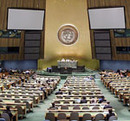21 July 2008: The UN General Assembly reconvened, on Monday, 21 July, to conclude the plenary meeting on the global food and energy crisis that began on 18 July 2008.
A number of countries, including Cape Verde and Syria, stressed the interlinkages between the food, energy and climate challenges.
On the causes of the food […]

21 July 2008: The UN General Assembly
reconvened, on Monday, 21 July, to conclude the plenary meeting on the global
food and energy crisis that began on 18 July 2008. A number of countries,
including Cape Verde and Syria, stressed the interlinkages between the food,
energy and climate challenges.
On the causes of the food crisis, the Congo, Kazakhstan and Syria underlined that
they are multiple. Nicaragua blamed the global economic model, while Libya
highlighted the exacerbating factor of the decline in financial aid directed at
sustainable development. He added that rising energy prices had contributed,
but were not central, to the surge in food prices. The Russian Federation
emphasized the impact of the sharp increase in the subsidized production of
biofuels and export subsidies on the food crisis.
On the means of addressing
the crisis, the Asian-African Legal Consultative Organization, the Congo, Cape Verde, Kazakhstan
and Syria called for
a holistic approach, while the Russian Federation added that the UN should play
a coordination role. On efforts carried out so far to tackle the food crisis,
the Congo mentioned efforts carried out by the UN and partner organizations, but
noted the insufficiency of current food aid levels. Qatar welcomed the support
provided to the Comprehensive Africa Agriculture Development Programme by
various UN agencies and partners.
The Asian-African Legal Consultative
Organization underlined the absence of a reference to fish stocks depletion in
the Comprehensive Framework for Action. On biofuels, the Congo stressed the
need for fairness in the balance between fuel and food crops. Nicaragua
called “inhumane” the planting of crops for biofuels production when hunger
exists. Kazakhstan and the Russian Federation stated that biofuels production
was one of the causes of the food crisis. Noting that bioenergy could be
produced from non-food fibers, the Asian-African Legal Consultative
Organization urged reviewing the use of food crops to that end. Most speakers outlined
necessary steps to tackle the food crisis.
The Asian-African Legal
Consultative Organization, Cape Verde and Kazakhstan emphasized the importance of strengthening
political will. The Congo called for supporting the World Food Programme
and reforming the World Bank and International Monetary Fund’s loan
requirements. Cape Verde called for: guaranteeing direct investment in
developing-world agricultural sectors; successfully concluding the Doha Round;
eliminating the external debt of poor countries; and reforming the global
financial architecture. Libya and Cape Verde highlighted the need of developing
countries for technology transfer and investment in infrastructure. Costa Rica
said the food and energy crises require innovative steps marked by solidarity
from the international community and, with Libya, urged a focus on increasing
global agricultural productivity. Nicaragua stressed the need for: adopting
structural measures; strengthening existing agricultural programmes; and
changing unsustainable consumption patterns in the North.
On financial
resources, Costa Rica and Cape Verde called for an increase in official
development assistance. Syria stated that resources for implementation of the
Comprehensive Framework for Action should be separate from official development
assistance, which was earmarked for activities related to the Millennium
Development Goals.
On the energy crisis, the Russian Federation said the
answers should include shared responsibility by consumers and producers, the
responsibility of transit countries, and the establishment of partnerships
among all stakeholders. He also supported the development of nuclear energy as
the main alternative energy source. [UN press release, 21 July
2008]